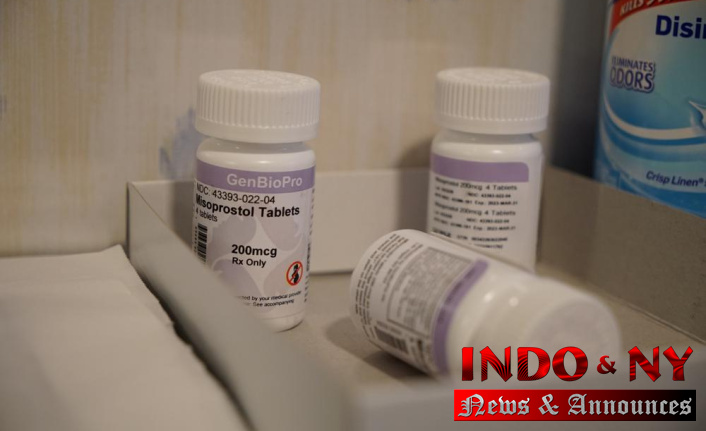Two trips across state lines and through icy roads, to allow a 32-year old South Dakota woman to obtain abortion pills last year took place.
These trips, and pills sent by mail, will become more important for abortion-seekers such as her. The Supreme Court's leaked draft opinion would allow states to ban abortion and overturn Roe v. Wade. Because she was concerned about her family's safety, the woman spoke under anonymity. She said that the abortion pills helped her end an unplanned and high-risk pregnancies and allowed her to be devoted to her children.
However, politicians and anti-abortion activists claim that they will continue to pursue cross-border trips, remote doctor's consultations, and pill delivery as a means of stopping abortion.
Mary Ziegler, an expert in reproductive rights and a professor at Florida State University College of Law, stated that medical abortion would be the place where access to abortion will be decided. "That's where the battleground will be decided about how enforceable abortion prohibitions are."
Since 2000, when the Food and Drug Administration approved Mifepristone as the main medication for abortions, the U.S. has seen an increase in abortion pill use. According to the Guttmacher Institute (a research group that supports abortion rights), more than half of U.S. abortions now take place with pills than with surgery.
Last year, the FDA lifted a long-standing requirement that abortion pills be picked up in person by women. Nationally, mail delivery is now permitted.
Online services now offer advice on how to obtain abortion pills, and even prescription assistance. The woman from South Dakota discovered that her state's abortion clinic was not able to schedule her for medication abortion. She found Just The Pill online, which advised her to drive to Minnesota to have a consultation with a doctor. She returned to Minnesota for the pills a week later.
She took the first one in her car almost immediately, and then she wept as she drove home.
She said, "I felt like a lost pregnancy." "I love my husband, and I love my kids and I knew exactly what I had gotta say goodbye to and it was a terrible thing to do."
South Dakota is one of many states where Republicans have attempted to limit access to abortion pills. This includes Texas, Kentucky and Arkansas as well as Tennessee, Tennessee, Ohio, Tennessee, Tennessee, Tennessee, Tennessee, Oklahoma, and Tennessee. Governor of South Dakota Kristi Noem, South Dakota Governor
Besides crossing state lines, women can also turn to internationally-based online pharmacies, said Greer Donley, a professor specializing in reproductive health care at the University of Pittsburgh Law School. Women may also be able to have their prescriptions for pills sent through other states without restriction.
It allows someone to have an abortion, even if they are not directly involved in the delivery. It will be harder for states to restrict abortion access," she stated, adding that "The question is how it is going to be enforced."
Sue Leibel is the state policy director at Susan B. Anthony List. She acknowledged that it was an issue that has "caught up" with Republican state legislators.
She said that "this is a new frontier" and that states are attempting to enforce laws. "The advice I always give -- if the front door is closed, the pills will come in the back."
Opponents of abortion claim they don't intend to prosecute women seeking abortions.
Leibel instead suggested that the next targets for state enforcement should not be pharmacies, clinics or organizations that sell abortion pills. Leibel also suggested that abortion-rights activists should concentrate on electing a presidential candidate to reverse the FDA decision.
According to the FDA, a scientific review recommended that access to the drug be expanded. However, complications were uncommon. Since 2000, 26 deaths have been reported by the FDA. However, not all can be directly attributed due to existing conditions or other factors.
Donley, a law professor at the school, is concerned that state legislators may soon turn their attention to women who receive the pills, despite new legal battles looming and abortion seekers going to greater lengths for the procedure.
She said that many anti-abortion legislators may realize that the only way to enforce these laws was to prosecute the woman who is pregnant.
The next battle for access to abortion will be over pills
Two trips across state lines and through icy roads, to allow a 32-year old South Dakota woman to obtain abortion pills last year took place.
These trips, and pills sent by mail, will become more important for abortion-seekers such as her. The Supreme Court's leaked draft opinion would allow states to ban the procedure, overturning Roe v. Wade. Because she was concerned about her family's safety, the woman spoke under anonymity. She said that the abortion pills helped her end an unplanned and high-risk pregnancies and allowed her to be devoted to her children.
However, politicians and anti-abortion activists claim that they will continue to pursue cross-border trips, remote doctor's consultations, and pill delivery as a means of stopping abortion.
Mary Ziegler, an expert in reproductive rights and a professor at Florida State University College of Law, stated that medical abortion would be the place where access to abortion will be decided. "This is going to be the battleground for deciding how enforceable abortion prohibitions are."
Since 2000, when the Food and Drug Administration approved Mifepristone as the main medication for abortions, the U.S. has seen an increase in abortion pill use. According to the Guttmacher Institute (a research group that supports abortion rights), more than half of U.S. abortions now take place with pills than surgery.
Last year, the FDA lifted a long-standing requirement that abortion pills be picked up in person by women. Nationally, mail delivery is now permitted.
Online services now offer advice on how to obtain abortion pills, and even prescription assistance. The woman from South Dakota discovered that her state's abortion clinic was not able to schedule her for medication abortion. She found Just The Pill online, which advised her to drive to Minnesota to have a consultation with a doctor. She returned to Minnesota for the pills a week later.
She took the first one in her car almost immediately, and then she wept as she drove home.
She said, "I felt like a lost pregnancy." "I love my husband, and I love my kids and I knew exactly what I had gotta say goodbye to and it was a terrible thing to have to do."
South Dakota is one of many states where Republicans have attempted to limit access to abortion pills. This includes Texas, Kentucky and Arkansas as well as Tennessee, Tennessee, Ohio, Tennessee, Tennessee, Tennessee, Tennessee, Oklahoma and Tennessee. Governor of South Dakota Kristi Noem, South Dakota Governor
Besides crossing state lines, women can also turn to internationally-based online pharmacies, said Greer Donley, a professor specializing in reproductive health care at the University of Pittsburgh Law School. Women may also be able to have their prescriptions for pills sent through other states without restriction.
It allows someone to have an abortion, even if they are not directly involved in the delivery. It will be harder for states to restrict abortion access," she stated, adding that "The question is how it is going to be enforced."
Sue Leibel is the state policy director at Susan B. Anthony List. She acknowledged that it was an issue that has "snuck up" on Republican state legislators.
She said that "this is a new frontier" and that states are attempting to enforce laws. "The advice I always give is: if you close the front door, the pill will come in the back."
Opponents of abortion claim they don't intend to prosecute women seeking abortions.
Leibel instead suggested that the next targets for state enforcement should not be pharmacies, clinics or organizations that sell abortion pills. Leibel also suggested that abortion-rights activists should concentrate on electing a presidential candidate to reverse the FDA decision.
According to the FDA, a scientific review recommended that access to the drug be expanded. However, complications were uncommon. Since 2000, 26 deaths have been reported by the FDA. However, not all can be directly attributed due to existing conditions or other factors.
Donley, a law professor at the school, is concerned that state legislators may soon turn their attention to women who receive the pills, despite new legal battles looming and abortion seekers going to greater lengths for the procedure.
She said that many anti-abortion legislators may realize that the only way to enforce these laws was to prosecute the woman who is pregnant.











